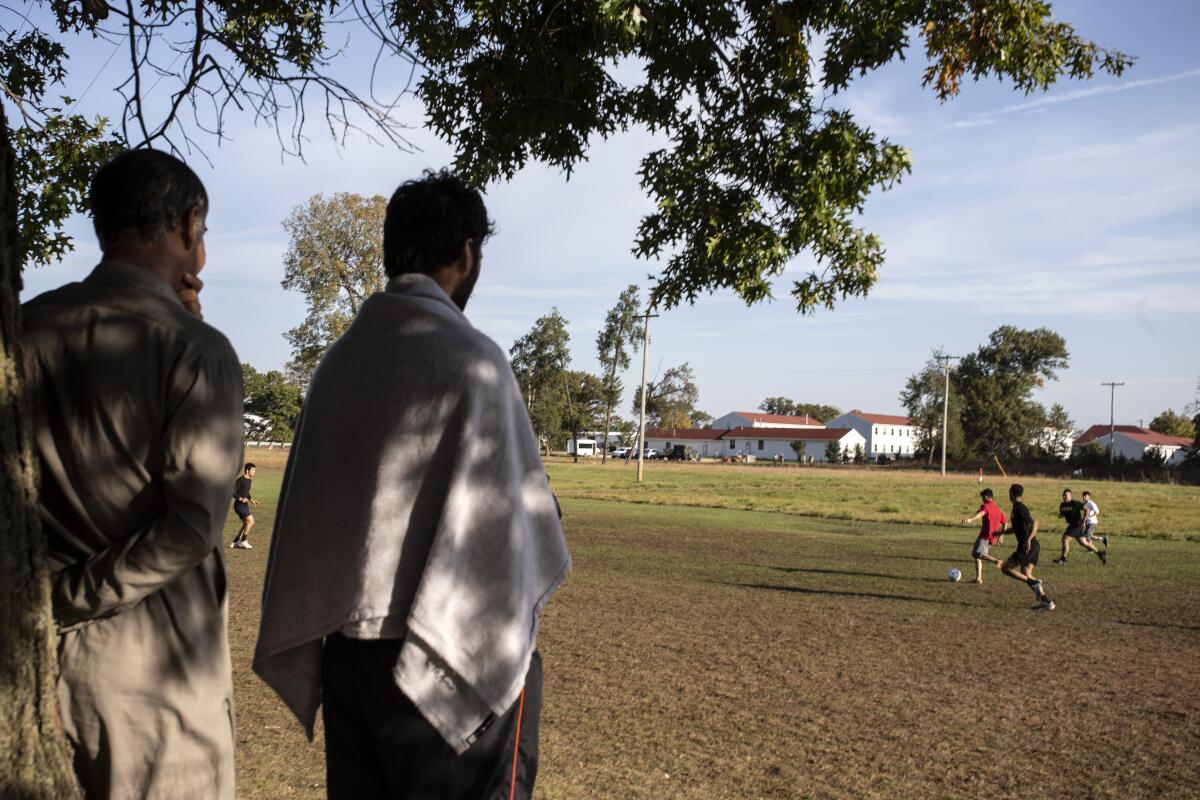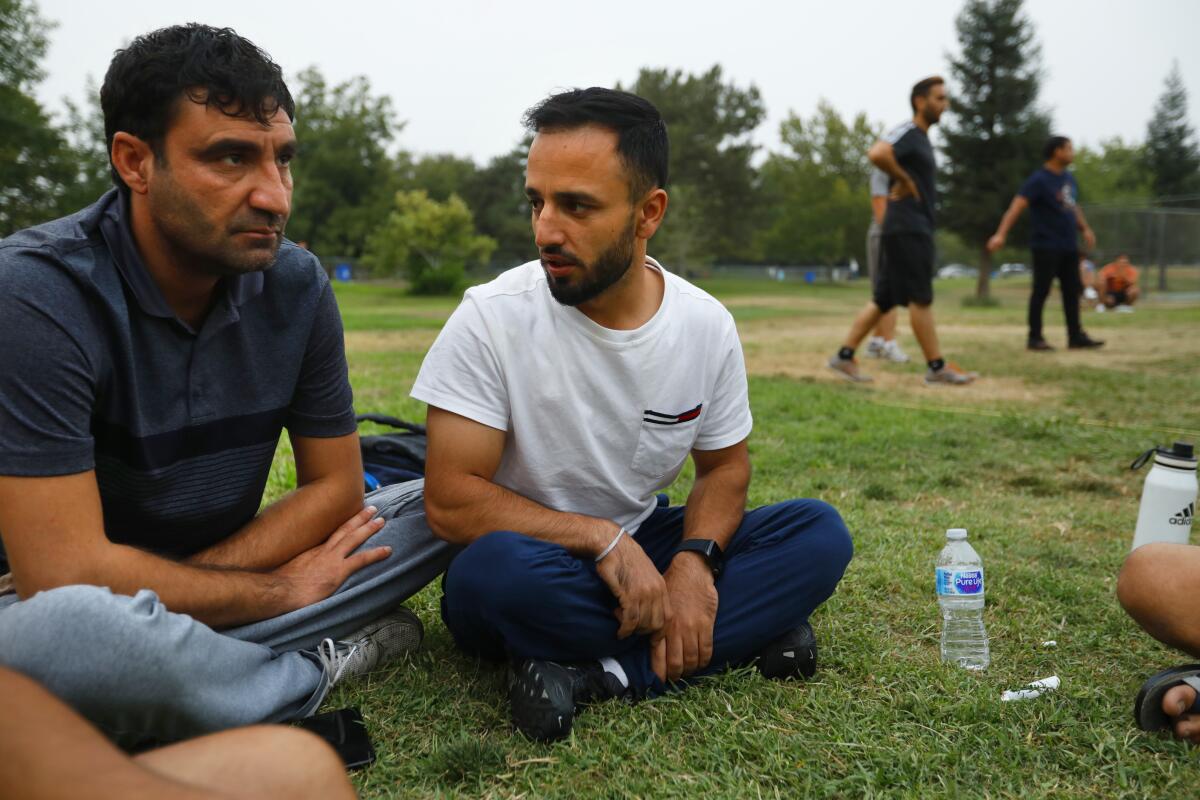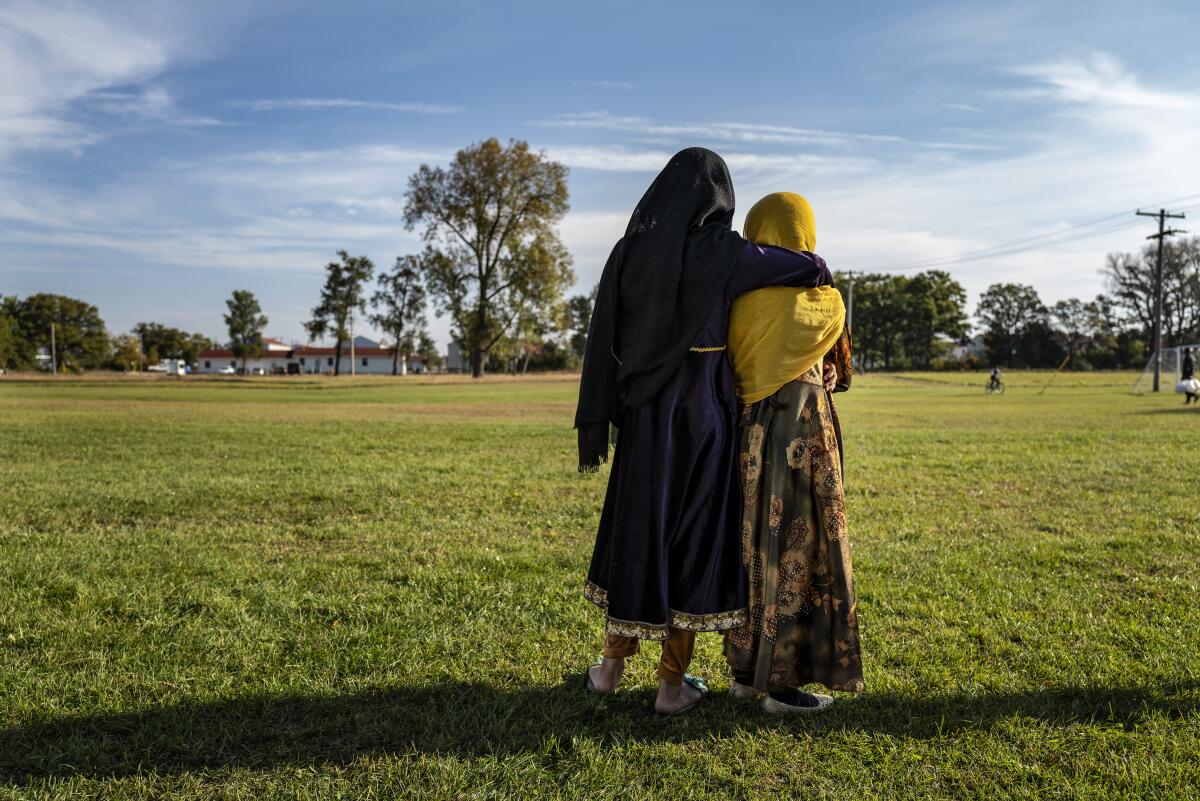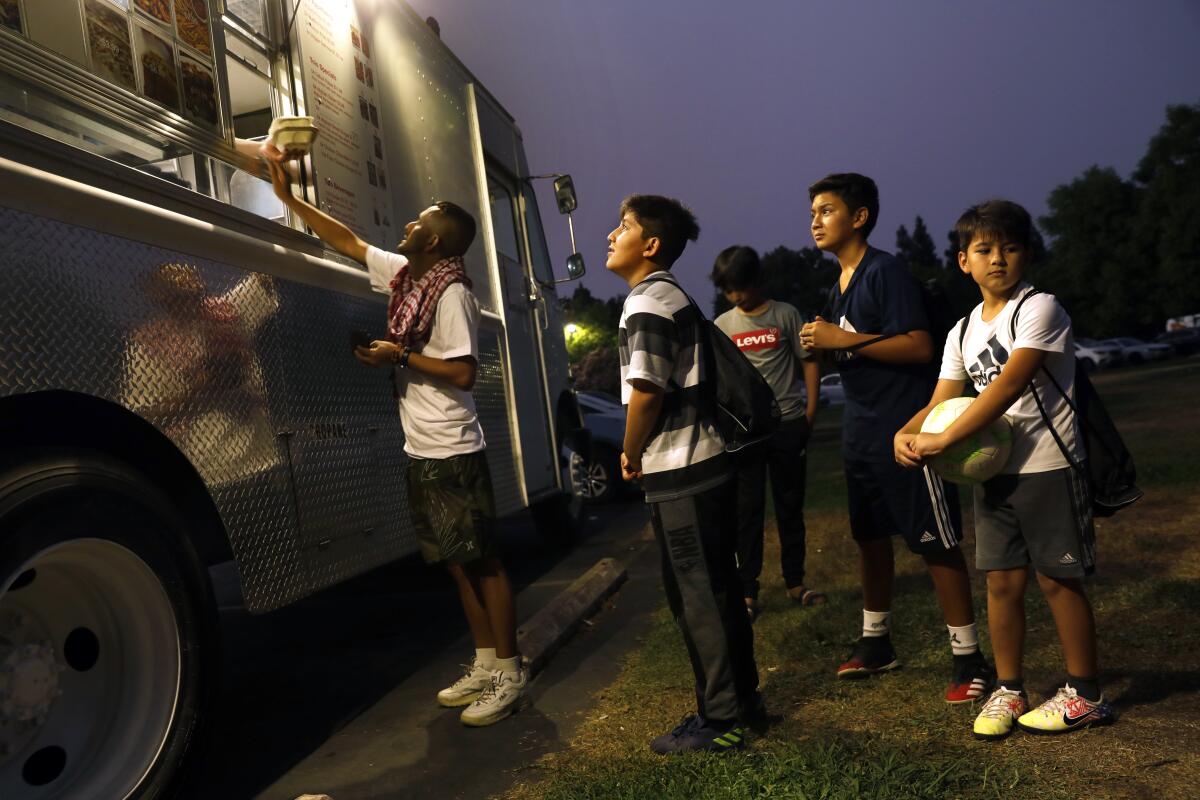Why are most Afghan evacuees still housed at U.S. military camps?

HOUSTON â When Taliban fighters hunting for Ahmad Shoaib Durgee knocked on his door in Kabul, Afghanistan, he scrambled to escape with his family of six to reunite with his sister in Sacramento.
Two months after they were flown to the U.S., they remain among 53,200 evacuees held at Ft. Lee, Va., and seven other military camps nationwide.
Durgee, 37, who qualified for a visa because he had worked as a security guard for American officials, says he feels fortunate to have been evacuated to a camp where he doesnât have to live in a tent. But heâs itching to leave the military housing. After hearing that those headed to California face longer waits, he changed his requested destination to Richmond, Va., where he has friends.
Each afternoon he looked for his name in Ft. Leeâs daily stack of âdeparture files,â those selected for resettlement.
âI ask them, âWhen my turn comes?â They say, âYou will be notified,ââ Durgee said by phone last week.
Since the Taliban takeover of Afghanistan in August, 124,000 people have been evacuated to the U.S., including 67,000 Afghan allies. Of those Afghans, 10,000 have been resettled with the help of nonprofit agencies in communities across the nation, according to the Biden administration.
A Biden administration official attributes the pace of resettlementto staff shortages, logistics issues and medical problems, including a measles outbreak among some transferred to U.S. camps. Nonprofit agencies tasked with resettling Afghan evacuees say they have been overwhelmed by the influx.
Government officials say they are seeking to increase the pace. But thereâs no deadline for resettling evacuees waiting at the military camps.
Congress approved $6.3 billion in added funding in September, but resettlement agencies said that has yet to reach them as they struggle to house evacuees. Most still wait in the camps, where Biden administration officials said an additional 30,000 are anticipated to arrive from Afghanistan during the next year.

Last month, the administration announced a pilot program that would allow groups of at least five individuals to apply to become âsponsor circles,â helping Afghan evacuees to resettle for at least three months. The program would supplement federal resettlement programs run by nine agencies nationwide with several hundred local affiliates.
âWeâre trying to prioritize getting those who were on the longest off the quickest,â said Curtis Ried, deputy to former Delaware Gov. Jack Markell, whom Biden appointed in September to coordinate Afghan resettlement.
Ried said the focus is resettling Afghans âin a way thatâs effective and sets people up for success.â
Abdul Rafie and his wife sat, mournful, giving up on a half-eaten lunch of kebabs.
Afghan evacuees at the military camps have already cleared customs and medical screening, including coronavirus testing and COVID-19 vaccinations. They have been processed by the nonprofit International Rescue Committee and their travel has been arranged by the International Organization for Migration, a United Nations affiliate. Before they leave the camps, Afghans are assigned a resettlement agency at their destination. That agency receives $1,225 from the federal government for each evacueeâs initial expenses.
About 3,000 evacuees have left the camps without waiting for help from a resettlement group after they were granted humanitarian parole and vetted, including Afghan American citizens, green card and visa holders, and others with close ties in the U.S., according to the administration. In doing so, these evacuees lose access to the assistance that would have been awarded to the resettlement agency, although theyâre still eligible for food stamps, Medicaid and other federal aid. With winter coming, more evacuees â especially those living in tents â were debating whether to leave on their own.
Those who requested to be resettled to states and cities that are already home to many of their fellow Afghans â Maryland, Virginia, Washington and California, particularly Sacramento â have faced some of the longest waits. Thatâs because U.S. officials have encouraged them to resettle in other states to avoid overwhelming the local resettlement agencies and schools. Some states, such as Oklahoma, have offered evacuees incentives such as free housing (280 Afghan evacuees have been resettled there, according to the Biden administration).
Walid Fazly, 34, said officials at Ft. Lee encouraged his family of 10 (including his wife, three children, parents, sister, brother-in-law and nephew) to resettle in Oklahoma after denying their request to be resettled with his older brother at his home in Austin, Texas.
âThey said that itâs because the resettlement agency in Austin canât handle all the cases,â he said, and that agencies elsewhere in Texas, California and Virginia were overloaded.
âThey said either you go on your own or to Oklahoma â thatâs the only option we can give you,â said Fazly, who had worked as a translator and coordinator with U.S. media and Ball State University in Afghanistan. âI donât even know where Oklahoma is.â
Fazly worried about his father, who had suffered a stroke years earlier, was in a wheelchair and had become despondent at Ft. Lee. After waiting more than 50 days, Fazly decided last month not to wait for a resettlement agency to help him. He bought plane tickets for the family to join his brother in Austin. Within days, he said his fatherâs mood had improved.
âEverybodyâs complaining about their mismanagement,â he said of the resettlement process. âTheyâre like, âYou have to be patient.â OK, patient until when?â

Munira Irzai, 27, a former custodian at the U.S. Embassy in Kabul, was evacuated with her husband and 2-year-old son to the Camp Atterbury Army post in Indiana, where 6,200 evacuees remained recently. She said she was told they would be sent to Kansas City, Kan., instead of joining a friend in Sacramento.
âThey should send us to the destinations we provided,â Irzai said through an interpreter.
Irzai, who received a green card last month, said she found a house to rent in Kansas City for $850, but still needs furniture.
âI have to go. My son has no warm clothes and the base is getting colder and colder every day,â she said.
An evacuee at Ft. Lee who worked at the U.S. Embassy in Kabul and with the Marines in Helmand province said U.S. officials told him his family could not be resettled to Alexandria, Va., where he has friends because âthe resettlement agencies donât have the capacity to process our cases.â
The man asked not to be identified because he and his family are still at the Army post. His luggage was lost, so heâs spent the last two months wearing two donated sets of clothes. Some evacuees who had worked with the U.S. military were given cellphones with service, he said, but he wasnât. He was still using his Afghan cellphone, which had no service in the U.S. except with Wi-Fi. He said his 7-year-old daughter, traumatized after seeing Afghan soldiers firing automatic weapons at the airport in Kabul, is afraid of troops at Ft. Lee and asks him to hide her from them.
He runs several WhatsApp groups for hundreds of evacuees at various camps. When Congress approved billions in added funding for the evacuation in September, he said, âWe were all dancing on the bases. They received the money! They are spending the money on us!â
But he said evacuees didnât receive additional supplies. He wishes he had gone to Australia, Canada or Germany, where evacuees he knows now have homes and jobs.
âThey are already starting their lives,â he said, while he fields calls from his father in Kabul, who needs money. âOur family is in a bad situation on both sides.â
He has started to see some of the 900 evacuees at Ft. Lee tell U.S. officials the unimaginable: âI would rather be back in Afghanistan.â
Resettlement groups in California have been overwhelmed by the influx of Afghan evacuees, still rebounding from years of underfunding during the Trump administration, said Lilian Alba, vice president of immigrant and refugee services at the nonprofit International Institute of Los Angeles.
âWe were quite surprised and not ready for this level of need. Weâre doing the best we can with what we have, but the program, itâs not organized. Thereâs a big need for resources and funding to resettle this many families,â she said.
Alba has four staffers, plans to hire 15 more during the next month and is training volunteers. But sheâs had difficulty finding bilingual people who can speak Dari and Pashto. An even bigger problem is the cost of living in California, especially housing during the pandemic, as some landlords demand double their normal security deposits and co-signers for leases. Only a few residents have been willing to house Afghan families temporarily, she said.
For the average family, the $1,225 per-person government benefit barely covers the minimum $1,700 rent and security deposit for a one-bedroom apartment in Los Angeles, plus food for the first month, Alba said. Congress has yet to approve monthly cash benefits for evacuees, so those whom Albaâs group helped apply have been rejected by landlords. Employers like Kroger have offered to hire evacuees for jobs with benefits, but evacuees still must pay initial moving costs.
âThe money we receive is not enough to cover the actual cost of resettling a family, of staff and operations. Thatâs why a lot of organizations are not able to assist more people,â Alba said.

She said California resettlement groups have urged federal officials to advise evacuees of the costs, so that they know that if they nonetheless choose to come to California, âitâs not going to be an easy road.â
âWeâve had families staying in hotels for four to six weeks. It is extremely overwhelming to them because they are looking for a home, stability. Many of the families have small children. That is why we are encouraging them not to come to California,â she said.
She said the pilot program allowing individual volunteers to resettle evacuees could help, but it could also backfire if volunteers struggle and turn to resettlement agencies for help.
âIt all circles back to the resettlement agencies and we have to do all of the education. Itâs not easy to be an advocate for Afghan evacuees,â she said. âThe government needs to be opening up slots for subsidized housing. They need to provide additional funds to organizations so we can staff and train rapidly to help resettle this level of cases.â
Rabbi Will Berkovitz, chief executive of Seattle-based Jewish Family Service, said his agency has also been challenged in staffing up as evacuees arrive. His group is still trying to get 170 Afghan families out of the country, including relatives of several youths evacuated to Seattle without their parents. He worries that evacuees released without help from a resettlement agency will end up turning to his group in crisis.
âIf you put a family with no connections in some other part of the city or state and then you send the kids to a school where they have no background working with these families and cultural sensitivities, youâre setting everybody up for failure,â he said. âItâs going to put massive pressure on organizations like mine.â
Durgee wanted to leave Ft. Lee on his own for Richmond recently, but he couldnât afford to travel there with his family. He had left Kabul with $400, and was down to $200.
He tries to distract his sons, ages 10 and 9, taking them outside to play in a military tent with toys and bringing them colored pencils. They drew pictures of Taliban soldiers with guns and repeatedly asked whether the Taliban would kill their grandmother back in Kabul.
âMentally, they are not relaxed here. That hurts me a lot,â Durgee said.
Recently, he met with military, State Department and resettlement officials and requested mental health services for evacuees. An official supervising resettlement at the camp reviewed his case, found his destination had not been changed from California to Virginia, and promised to follow up. But she didnât tell him when his family would be resettled.
And so, they wait in limbo.
More to Read
Sign up for Essential California
The most important California stories and recommendations in your inbox every morning.
You may occasionally receive promotional content from the Los Angeles Times.





![[20060326 (LA/A20) -- STATING THE CASE: Marchers organized by unions, religious organizations and immigrants rights groups carry signs and chant in downtown L.A. "People are really upset that all the work they do, everything that they give to this nation, is ignored," said Angelica Salas of the Coalition of Humane Immigrant Rights. -- PHOTOGRAPHER: Photographs by Gina Ferazzi The Los Angeles Times] *** [Ferazzi, Gina -- - 109170.ME.0325.rights.12.GMF- Gina Ferazzi/Los Angeles Times - Thousands of protesters march to city hall in downtown Los Angeles Saturday, March 25, 2006. They are protesting against House-passed HR 4437, an anti-immigration bill that opponents say will criminalize millions of immigrant families and anyone who comes into contact with them.]](https://ca-times.brightspotcdn.com/dims4/default/34f403d/2147483647/strip/true/crop/1983x1322+109+0/resize/840x560!/quality/75/?url=https%3A%2F%2Fcalifornia-times-brightspot.s3.amazonaws.com%2Fzbk%2Fdamlat_images%2FLA%2FLA_PHOTO_ARCHIVE%2FSDOCS%2854%29%2Fkx3lslnc.JPG)





